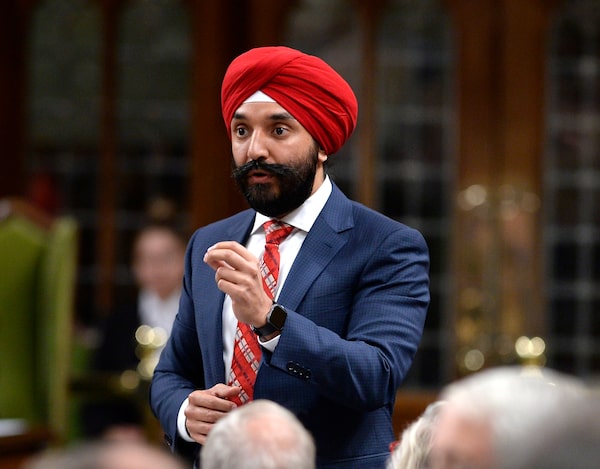
Minister of Innovation, Science and Economic Development Navdeep Bains rises during Question Period in the House of Commons on Parliament Hill in Ottawa on Sept. 24, 2018.Justin Tang/The Canadian Press
Innovation Minister Navdeep Bains says the government hasn’t seen enough action from CRTC and hopes that a new policy direction will spur the regulator to promote more telecom competition and lower prices.
The federal minister announced the proposed policy direction on Tuesday, saying he wants the Canadian Radio-television and Telecommunications Commission to put more emphasis on new forms of competition, affordability, consumer protection and innovation. If finalized as expected in late spring, the change would mark a departure from a 2006 policy direction that focuses primarily on market forces and encouraging network investment.
In an interview on Tuesday, Mr. Bains said he wanted to send a clear message to the CRTC in time for a planned review of the wireless market that could see the regulator support a wireless reseller model in Canada, an issue the federal government has pushed before without much success.
Ottawa ordered the CRTC to reconsider a ruling on the topic in 2017, but in its decision last year, the commission declined to force large wireless carriers to sell access to their networks to players who don’t invest in their own infrastructure, known as mobile virtual network operators, or MVNOs. The commission cited the 2006 policy direction in its decision, noting that the ruling “relies on market forces to the maximum extent feasible.” Instead, the CRTC asked BCE Inc., Rogers Communications Inc. and Telus Corp. to offer new low-cost, data-only wireless plans.
“Once that was unveiled, it was a step in right direction but more needed to be done. That’s why we’re bringing forward this policy direction,” Mr. Bains said on Wednesday, explaining why he didn’t act sooner, with only months left in the current government’s mandate. “We wanted to send a very clear policy signal, particularly because the wholesale wireless review is taking place [later this year] and we think this is an important opportunity.”
The CRTC is due to announce the details of its review of the wholesale wireless market later this week. A central issue is likely to be whether to mandate some sort of MVNO model, potentially one where resellers offer service primarily over WiFi but rely on buying wholesale network access to give their customers cellular service when they are not connected to WiFi.
“The onus is on the CRTC to determine what steps they will take. But we want to see more innovation, we want to see more competition. So, the WiFi-first MVNO model, for example, is one possibility,” Mr. Bains said. “What we want ultimately to see is prices go down.”
The Big Three, as well as regional wireless players Freedom Mobile, Vidéotron and Eastlink, oppose mandated MVNO access and have argued it would undermine the value of significant network investments they have made.
The government’s announcement this week caught some off guard, according to two industry sources who were not authorized to comment on the situation publicly. One person said the shift away from a policy direction favouring investment was particularly surprising after Finance Minister Bill Morneau recently praised both BCE and Freedom Mobile-owner Shaw Communications Inc. for making network investments the companies attributed to favourable tax changes the government introduced.
Still, numerous smaller industry players, as well as internet advocacy group OpenMedia praised the proposed change.
“Could it have come sooner? Perhaps, but the best time to plant a tree was forty years ago, the next best time is right now,” said Matt Stein, president of the Canadian Network Operators Consortium, which represents third-party internet providers such as TekSavvy and Distributel (Mr. Stein is also the CEO of the latter).
He said he’s optimistic the policy direction could improve the terms through which third-party internet providers get access to high-speed fibre-optic broadband service.
RBC Securities analyst Drew McReynolds said the proposed change “raises the regulatory temperature” heading into the CRTC’s wireless review. But he added, “we believe it is premature to conclude that this directive represents a wholesale shift in wireless regulatory policy,” noting that the industry has offered lower-cost data plans and regional players have had some success in forcing the Big Three to lower prices.
BCE spokesman Marc Choma said the company would emphasize in consultations around the proposed change that “any policy direction must encourage investment in the high-quality broadband networks necessary to ensure Canadians continue to enjoy affordable, high-quality wireless and Internet access no matter where they are.”
Rogers’s Sarah Schmidt said the company is "guided by these same considerations [as in the proposed policy direction] when we develop our innovative services for our customers.”
Telus also said it would participate in consultations on the policy directive. Spokesman Richard Gilhooley said, “we will reiterate our belief that Canada’s regulatory environment needs to both inspire brisk competition and encourage the billions of dollars in network investment."
Eastlink spokeswoman Jill Laing said, “As a facilities-based provider that services primarily smaller communities, we have a strong and vested interest in any changes to policies that could impact our ongoing ability to invest and expand our services."
Representatives for Shaw and Quebecor declined to comment.